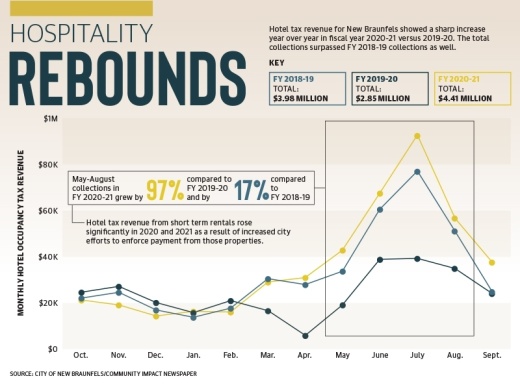Local entertainment operations and businesses reported a successful and busy tourism season, as evidenced by increased revenue and attendance numbers, though staffing shortages and rising product costs created strain across all industries.
The annual river tubing season, which runs from Memorial Day weekend through Labor Day weekend, serves as a backbone of the local tourism industry, said Amy Niles, who is the city’s river operations manager.
During the season, a $2 river management fee is charged to each visitor through both the city and independent tubing outfitters, Niles said.
In 2021, river revenue rebounded to $482,864 as the river remained open for the entirety of the season and Niles’ team saw an influx of new visitors.In 2019, a total of $497,492 was collected, and that total dropped to $183,858 in 2020.
Fees were only charged on five weekends from May 23-June 21, 2020, instead of a normal 15 weekend summer. The season was cut short on June 26, 2020, when Gov. Greg Abbott prohibited outfitters from operating shuttle vehicles and renting tubes.“The 2020 season was exceptionally busy when we were open,” Niles said. “A successful river season will translate to being a successful tourist season for the community as a whole.”
Return to normalcy
In 2021, crowds also returned to Schlitterbahn Waterpark and Resort in New Braunfels, and the park surpassed attendance and revenue goals for 2021, said Aaron Martinez, communications and digital marketing director for Schlitterbahn.
“We saw a pent-up demand for people wanting to get out of the house and get back to having fun with their families,” Martinez said. “We had a reservation system in place for the majority of the year.”The reservation system determined how many people would be at the park each day, which helped staff plan how and where to place employees, Martinez said.
Independent tubing outfitters such as Rockin R River Rides also reported increased revenue this year as residents and visitors were anxious to get back on the river, Rockin R owner Shane Wolf said.
“For all industries and markets, it was hands down better this year to say the least,” Wolf said. “Rockin R had a little bit of an advantage last year just because we have property over on the Guadalupe, so we still were able to allow individuals access to the river, but by all means [revenue] was in single-digit percentages compared to what we would expect to have done.”
In 2021, 78.62% of river maintenance fee revenue collected by the city came from independent outfitters, Niles said, while the remaining 21.38% was collected directly by the city.
Previously, 76.68% of guests accessed the river through outfitters in 2020. Niles said an influx of first-time visitors to the river and the temporary closure of some area parking this summer contributed to the shift.
For Beverli Mahnke, property manager at the Old Mill Resort at Gruene, this summer brought more bookings as tourists returned to the area and weddings were scheduled at the 21-acre venue. “We were booked solid almost every weekend, and even our midweek bookings were definitely up,” Mahnke said. “I think people were just ready to get out, and Gruene is a great place to come [visit].”
Rising revenue
Hotel occupancy tax revenue also skyrocketed in fiscal year 2020-21 after $4.41 million was collected, surpassing FY 2019-20 collections by 54.7% and FY 2018-19 collections by 10.8%, according to city documents.
Hotel taxes are paid by guests who stay in a hotel or other short-term lodging option, according to the Texas Comptroller’s Office.According to Jared Werner, New Braunfels’ assistant city manager, hotel tax revenue is just one indicator of the strength of the local tourism and hospitality industries.
“New Braunfels is also a very popular day trip destination, too, which is why we certainly understand this is not all-encompassing,” Werner said. “But it certainly speaks to how committed are folks to spending multiple days in this community for either their business or leisure travel.”
A major factor Werner said contributed to the increased revenue was the city’s effort to enforce tax payment compliance from short-term rental properties.
Compared to FY 2018-19, FY 2020-21 hotel tax revenue from short-term rentals increased by 62.34%, Werner said, and the revenue accounted for 28% of total hotel tax funds collected during the fiscal year. “We had brought in a new short-term rental property identification software system and new occupancy tax payment portal,” Werner said. “Anyone that was operating that we weren’t aware of was identified and educated on what is required from the perspective of remitting local occupancy taxes.”
Werner said the final hotel tax revenue for FY 2020-21 will be the largest annual collection of occupancy tax ever received by the city.
Sales tax revenue was also up in New Braunfels, with the city collecting 32.1% more revenue in July 2021 than the same month last year, according to a report from the city.
Werner said industries that were most significantly affected by pandemic-related closures saw the greatest gains in sales tax returns between March and August of 2021 compared to 2020.
During that period, full-service restaurants saw their tax returns grow by over 50%, and department stores saw a 30% increase, he said. “If we look at the general services category, which includes tourism, frontline service-related industries, since March they’re growing at a rate of about 60%,” Werner said. “Seeing those large gains year over year, especially when you break down that data and look at a specific industry, has been surprising.”
Bringing visitors back
In summer 2020, the New Braunfels City Council allocated roughly $292,450 in federal funding to the chamber of commerce to create a marketing and advertising campaign. Mallory Hines, vice president of the convention and visitors bureau, said the advertising initiatives started with the funding helped attract visitors to the city.
“Before we had that [funding], we were having to scale back our promotional efforts,” Hines said. “It did allow us to step a little bit into some new digital frontiers. ... I think it’s really important to reach people on the mediums they’re using today.”

The marketing efforts focused on television advertising, social media partnerships and retargeting strategies that created local ads to follow users. In addition to promoting the city’s summer attractions and local businesses, marketing efforts also included local festivals and events that regularly draw visitors. Wurstfest is one such festival that attracts visitors from around the country, according to the Wurstfest Association.
After the cancellation of the 2020 celebration, the 2021 festival was highly anticipated as it was the 60th Wurstfest and the first to utilize a newly built Marktplatz building, said Dan Tharp, chair of Wurstfest’s marketing committee. “It was made more special this year than it might have been if we had been able to have a festival last year just because of everything that we’ve been through together as a community,” he said.
Staffing struggles persist
Even as visitors returned to the city and revenue climbed, area businesses struggled to find enough employees to meet the demands of a busy tourism season.
“I didn’t talk to a single outfitter this summer that didn’t express concern about being short-staffed,” Niles said. “In some ways we were all in it together, but it definitely was a challenge.”
At Schlitterbahn, staff shortages caused the park to decrease its hours, Martinez said. Instead of opening from 10 a.m.-8 p.m., the park opened from 11 a.m.-6 p.m. and occasionally expanded hours to 7 a.m.-7 p.m.
“We by no means were exempt from the staffing challenges that are prevalent in our industry in the service industry in general,” Martinez said. “If we did not have the amount of lifeguards needed, then that meant certain attractions may or may not get to open.”Wolf said managers had to step in at Rockin R to fill in for drivers, and Mahnke said she struggled to hire consistent housekeeping staff.
Though the summer was profitable, both Wolf and Mahnke say they are hopeful that they will be able to operate with a full staff in 2022 to welcome visitors to New Braunfels.“I just could not do this without [the staff],” Mahnke said. “I’m delighted that we did so well this summer. ... We just all had to pitch in.”






